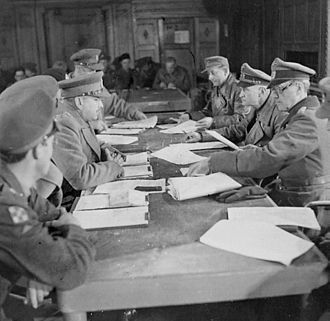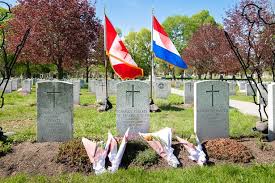General Charles Foulkes: The Liberation Legacy
Section 27, Range G, Grave 224
General Charles Foulkes was a distinguished military leader whose career spanned pivotal moments in Canadian and world history. Born in Stockton-on-Tees, England, on January 3rd, 1903, he moved to Canada with his family, eventually settling in London, Ontario.
Foulkes began his military journey by joining the Canadian Militia in 1926, demonstrating early promise. His abilities were quickly recognized, and in 1937 he attended the Staff College in Camberley, England, where he received commendation for his sound competence and determination.
With the outbreak of World War II in 1939, Foulkes was already serving as a major with the 3rd Canadian Infantry Brigade, marking the beginning of a remarkable wartime career. Rapidly rising through the ranks, Foulkes commanded various units, showcasing exceptional tactical knowledge and leadership. Notably, he led the 2nd Canadian Infantry Division through the Normandy Campaign and later assumed command of the I Canadian Corps in Italy and Northwest Europe.
General Charles Foulkes played a pivotal role in the liberation of the Netherlands during World War II, leaving an indelible mark on Dutch history and earning enduring gratitude from the Dutch people.
In May 1945, as the war in Europe neared its end, Foulkes found himself in negotiations with German General Johannes Blaskowitz for the surrender of German forces in the Netherlands. This meeting took place in the Hotel de Wereld in Wageningen, a town that would soon become synonymous with the country's liberation. Despite logistical challenges, including the lack of a typewriter to finalize the surrender document, Foulkes demonstrated patience and determination. With Prince Bernhard of the Netherlands also present, Foulkes ensured that the terms were agreed upon, laying the groundwork for the official surrender the following day.

On May 5th, 1945, General Blaskowitz formally surrendered all German forces in the Netherlands to General Foulkes, marking the end of Nazi occupation in the country. This momentous occasion brought joy and relief to the Dutch people, who had endured years of hardship under German rule. Foulkes's leadership and diplomacy during these negotiations not only secured the surrender but also helped establish a foundation for post-war reconciliation and reconstruction in the Netherlands. His role in the liberation of Holland remains a testament to his courage, integrity, and commitment to freedom and justice.

Post-war, Foulkes continued to serve Canada with distinction.He was appointed as the first Chief of the General Staff, later becoming the Chairman of the Chiefs of Staff Committee. Foulkes played a significant role in shaping Canada's military posture during the Cold War era, advocating for initiatives like the North American Air Defense Agreement (NORAD). His dedication and contributions to the Canadian Armed Forces were widely recognized, culminating in honors such as the Companion of the Order of Canada.
Foulkes retired in 1960 but continued to share his expertise, teaching at Carleton University until his passing in Ottawa in 1969.
Today, his legacy endures through the artifacts and memories preserved at the Royal Canadian Regiment Museum in London, Ontario, ensuring that his remarkable achievements continue to inspire future generations.


